GRAFFITI & STREET ART WITH STEINAR CASPARI | E012 PODCAST
LISTEN TO THIS EPISODE ON ALL STREAMING SERVICES
ABOUT THE GUEST
Steinar Caspari sits down with George Stroumboulis in Oslo, Norway on the Invigorate Your Business Podcast.
Steinar Caspari is a Norwegian graffiti professional known across Norway and Europe for his incredible artwork that is displayed on canvases and buildings. He makes a tremendous living from his craft and has recently launched his own art space that boasts his artwork, creates an environment for aspiring artists and has become a hub for all things graffiti and creativity - known as the Caspari Art Space.
Early on in his career, he was looked down upon when he started doing graffiti paintings on buildings in the late 1990s in Oslo, Norway. Since those early days, Caspari has become a renowned graffiti artist with more than 1,000 commissions to his name - ranging from small walls in private homes to large projects measuring hundreds of square meters. Make sure to stay in contact with Steinar.
WEBSITE: https://www.steinarcaspari.no/
INSTAGRAM: https://www.instagram.com/steinarcaspari/
TIKTOK: https://www.tiktok.com/@scaspari
LINKEDIN: https://www.linkedin.com/in/steinar-caspari-68432b174/
“I know the American ways to be more out there and self-promote and I think in Norway and many other, like European countries, I think it’s not, we don’t have that tradition. But I have no problems saying to people that you won’t find a better graffiti artist than me in Norway.”
MEDIA RELATED TO THE EPISODE
Steinar Caspari sits down with George Stroumboulis in Oslo, Norway at the Hotel Grand Oslo on the Invigorate Your Business Podcast to talk about all things graffiti, art and pursuing your passions.
Steinar Caspari sits down with George Stroumboulis in Oslo, Norway at the Hotel Grand Oslo on the Invigorate Your Business Podcast to talk about all things graffiti, art and pursuing your passions.
Steinar Caspari is a professional graffiti artist - having been commissioned over 1000 times for his masterpieces. George Stroumboulis interviewed Steinar on a trip to Oslo, Norway.
George Stroumboulis travels the world and sits down with clients, partners and guests from all walks of life. Here in Oslo, Norway at the well known hotel, Hotel Grand Oslo.
ABOUT THE “INVIGORATE YOUR BUSINESS” PODCAST
The Invigorate Your Business with George Stroumboulis podcast features casual conversations and personal interviews with business leaders in their respective fields of expertise. Crossing several industry types and personal backgrounds, George sits down with inspiring people to discuss their business, how they got into that business, their path to the top of their game and the trials and tribulations experienced along the way. We want you to get inspired, motivated, and then apply any advice to your personal and professional lives. If there is at least one piece of advice that resonates with you after listening, then this podcast is a success. New episodes weekly. Stream our show on Spotify, YouTube, Apple, Amazon and all other platforms.
ABOUT GEORGE STROUMBOULIS
George Stroumboulis is an entrepreneur to the core, having launched several ventures across multiple industries and international markets. He has held senior-level positions at progressive companies and government institutions, both domestically and internationally, building an extensive portfolio of business know-how over the years and driving profit-generating results. George’s ability to drive real change has landed him in several media outlets, including the front page of the Wall Street Journal. George was born in Toronto, Canada to his Greek immigrant parents. Family first. Flying over 300,000 miles a year around the world puts into perspective how important family is to George’s mental and emotional development. With all this travel to global destinations, the longest he stays even in the most far-out destination is 3 days or less - a personal rule he lives by to make sure he is present and involved in family life with his wife and three daughters. To read about George’s global travels, stay connected with his blog section.
STAY CONNECTED WITH GEORGE STROUMBOULIS
STREAM & LISTEN TO THE PODCAST:
SPOTIFY: https://open.spotify.com/show/1rW2CmxQoiJNEPOZupJlvd
YOUTUBE: https://www.youtube.com/user/Stroumboulis
APPLE iTUNES: https://podcasts.apple.com/us/podcast/invigorate-your-business-with-george-stroumboulis/id1607693240
AMAZON MUSIC: https://music.amazon.com/podcasts/8fc03929-71b3-483a-a64e-153e30b3d462/invigorate-your-business-with-george-stroumboulis
iHEARTRADIO: https://www.iheart.com/podcast/269-invigorate-your-business-w-92187370/
STROUMBOULIS SITE: https://www.stroumboulis.com/podcast
PODCAST SITE: http://www.invigorateyourbusiness.com
OTHER SERVICES: GOOGLE, PANDORA, OVERCAST, CASTRO, CASTBOX, PODFRIEND, PLAYER.FM, PODCASTADDICT, PODCHASER, PODCASTINDEX and RSS FEED.
FOLLOW GEORGE STROUMBOULIS:
INSTAGRAM: https://www.instagram.com/georgestroumboulis/
YOUTUBE: https://www.youtube.com/user/Stroumboulis
LINKEDIN: https://www.linkedin.com/in/Stroumboulis/
TWITTER: https://twitter.com/Stroumboulis
FACEBOOK: https://www.facebook.com/georgestroumboulis
TIKTOK: https://www.tiktok.com/@georgestroumboulis
CONTACT GEORGE DIRECTLY: https://www.stroumboulis.com/connect
FULL SHOW TRANSCRIPT
George Stroumboulis: What advice would you give someone who is a teenager today or younger and wants to do this as a career?
Steinar Caspari: Ambition is, of course alongside with the joy that it gives. You're really passionate about it then. I mean, maybe don't stop. I mean, because everyone's life, it comes to a different phases or whatever, and maybe there is a year or two that you don't really get to do as much as you want. You're focusing on other things. If you continue the drawing, if you have the passion for it, I mean, then I think you have to like, just recognize that it's possible for you to achieve maybe making it the full-time thing.
George Stroumboulis: In today's episode, we tackle a subject I know very little about; the whole world of arts and artwork. I sit down with someone in Oslo, Norway, who is a professional graffiti artist. His work is seen all over the city, the country, and even the region. Steinar Caspari is a true legend, and I sit down with him in Oslo, Norway to discuss the business of graffiti. My name is George Stroumboulis, and I'm extremely passionate about traveling the world, meeting new people, and learning about new businesses. Join me as I sit down with other entrepreneurs to learn about their journeys. This episode of Invigorate Your Business starts now.
So, Steinar Caspari, which is an Italian last name, right? Sounds Italian?
Steinar Caspari: Yes, yes.
George Stroumboulis: Cool name. Very cool name.
Steinar Caspari: Thank you.
George Stroumboulis: I literally, without exaggeration, landed probably less than two hours ago here in Oslo, Norway. First time I've ever been here. And you were so gracious with your time to sit down with me and just talk about your business, your story. I know nothing about your space from the business side of it, but I appreciate it on this side of it, right? Like as a consumer and through social media, I saw a lot of the stuff you've been doing here. Very famous here with what you do. Graffiti artist, really remarkable stuff. And like, throughout this stuff, while we're talking, I would hope we can share a lot of the work you've done because it's remarkable. So thank you for sitting down with me and welcome to the podcast.
Steinar Caspari: Thank you.
George Stroumboulis: Awesome.
Steinar Caspari: Yeah, it's exciting.
George Stroumboulis: Absolutely.
Steinar Caspari: I'm looking forward to this.
George Stroumboulis: Yeah, man. So what time is it now? It's almost 10 o'clock. We just grabbed a couple beers.
Steinar Caspari: Yeah. What time is it in? Where are you from?
George Stroumboulis: California. So, 11 hours, what is it now? It's eight hours, I think.
Steinar Caspari: Yeah. Like 10, forward.
George Stroumboulis: Behind.
Steinar Caspari: Backwards, yeah.
George Stroumboulis: Yeah. So I flew 11 hours. LA, London. London, a couple meetings, and then London here. Straight. So don't judge me if I'm glossy eyed.
Steinar Caspari: I was about to say that. You must be a little jet lagged. And it's funny to think that your family is in a different time.
George Stroumboulis: It's very odd. You're trying to get to bed. They're running. It's fine though. You know what? And we're only here for 24 hours, which is great. So Oslo, I want to start off with, what is Norway all about, right? Like, talk to me just culturally, what does that represent to you? Because from the outside, I have my own ideas on what I think Norway is the Norwegian and the culture, but I would love to hear from you, like, why is Norway special?
Steinar Caspari: Oh, man, that's a pretty big question. I mean, Norway is, we're an old country, you know, with the lots of tradition and stuff. I'm from the oldest city, Norway, which is called [inaudible].
George Stroumboulis: Yeah. Oh, wow.
Steinar Caspari: Which is famous, like a Viking city. Lots of stories about that. I don't really care about Vikings. I know when you get tired of stuff, you know it's too much focus on it. But anyway, Oslo is the biggest city. Of course, it's the capital of Norway. And I think in general, people in Norway are like actually pretty light and happy and content. That’s the word, yeah?
George Stroumboulis: Content, yeah. Like happy with everything.
Steinar Caspari: In one way. Yeah. I mean, we have a really great healthcare system and I mean, schools are free. All these goods that you can find out about on Google. But also I hear that foreigners coming here, they call us a little when we're closed inside ourselves. What do you call that? Like –
George Stroumboulis: Ethnocentric? Like yeah. About your culture, right?
Steinar Caspari: Yeah, but also, like we're not like my picture of the average American is like, the American guy is like, Hey, like really out there, outgoing. Norwegians can tend to be a little more inward.
George Stroumboulis: Yes.
Steinar Caspari: And so I heard –
George Stroumboulis: Well, I'm Canadian. I grew up in Canada. I live in California now.
Steinar Caspari: So, I called you an American.
George Stroumboulis: But I'm an American citizen as well, right? So before moving to the States, I had that idea of an American, like, just very positive, very loud, I'll tell you everything I know right now, right? Like from the outside looking in. And then living there, right. You start seeing like how it really is, like amazing people. They're very confident and it's a great system if that's what you want to achieve and to go higher and to higher and higher. But then I also have that socialist based type upbringing in Canada where you're like, all right, there's good and bad to it as well. Like you said, the healthcare and this education. And yeah, again, going deep into that every country has its good and bad, of course, right? But for me, from Norwegians, my experience travels throughout Europe. Anytime you'd come in contact with Norwegian tourist, or when you see Norway playing in a World Cup or at the Olympics, it's like a powerful brand. Like the country has a powerful brand to it. And everyone is just very, from my experience, to have conversations with people very open, very worldly, and just kind of laid back is what I see.
Steinar Caspari: I think it's a good view on the region’s, I mean, in sports and stuff, and especially winter sports, Norway is always up there.
George Stroumboulis: Always.
Steinar Caspari: And also when you say worldly, I think Norwegians travel a lot from when you graduate, what do you call?
George Stroumboulis: Like a high school or college?
Steinar Caspari: College.
George Stroumboulis: University.
Steinar Caspari: University, yeah. But we have a different system though, because we have high school and then we have three years of college probably. And then we go to university to study for this and that.
George Stroumboulis: To prepare you. Okay.
Steinar Caspari: Yeah. So after we graduate from public, the college part, which is where you say you have to be there to get your grades so you can then apply for other things. And then a lot of us travel maybe for a year or two just to get to know the world a little bit. Because I think in Norway, the media, I mean, you could never know, but I think in some ways, in my mind, Norway and Canada is a little similar maybe. I think we get the actual news, I think we get a pretty decent view upon the world of what's going on here and there. And we have international channels. We follow it. And I mean, I think I can trust the news a little bit from the –
George Stroumboulis: From your side, yeah.
Steinar Caspari: Norwegian News. I don't trust American news that we see.
George Stroumboulis: That you see coming. And it depends even within the states, it's very black and white on, if you believe in this, you watch this channel. If you believe in this, you watch this channel. So a lot of the times, I try to go to outside sources and again, I don't even want to say the C word, but the pandemic, right? Because this'll will probably get flagged and taken down, but you know, even the way Canada handled it, my opinion and what they were doing to the people from the media, like, I even stood back from the Canadian media, and it's very hard. So you try to get bits and pieces from everywhere. And again, don't want this to get flagged on YouTube, so I'm not even going to discuss the pandemic and all that. But I'll tell you one thing, landing tonight, my first impression, I was blown away. I counted easily 25 soccer stadiums. We're in January right now, it's very cold here. And they were all lit.
Steinar Caspari: Yeah. And green also.
George Stroumboulis: And green. And it was amazing. But it was nighttime when I was landing, so I would just see these pitches. So, and I've never landed in a city, anywhere in the world where I've seen that many soccer fields coming in, just scattered across. Then you would see the odd outdoor rink.
Steinar Caspari: Yeah.
George Stroumboulis: But I was amazed. Like the national sport here is hockey, or is it?
Steinar Caspari: Yeah, man, I think it's like in the winter, it's I mean, football is huge. Of course, the European football version. We don't have as much American football, but some here and there, but it's not like shown on TV and stuff, but we have the cross-country skiing and all kind of downhill. Very similar to Canada, I guess.
George Stroumboulis: Yes.
Steinar Caspari: So, which I would say that cross-country skiing is probably the national sport.
George Stroumboulis: Geez. And in cold water plunging and outdoor saunas here in Oslo. I'm actually doing that tomorrow morning. I'm excited.
Steinar Caspari: Nice.
George Stroumboulis: Yeah. So tell me, you were born and raised here. You've traveled. Let's get into, like, you are a graffiti professional graffiti artist. Professional means this is your full-time thing. You are really good at it and get paid for doing it. How do you even get into graffiti, which is the obvious –
Steinar Caspari: Yeah.
George Stroumboulis: Breaking the law, tagging it. But like, how did you start, how did you know you were even good?
Steinar Caspari: Yeah. You know, I was one of those kids who never stopped drawing and painting. I think most kids like drawing and painting when they're really small. And a lot of them stop and some don't. And I was the guy who didn't stop, and I never really played soccer. I was really into just staying inside the drawing, painting stuff. And my mom had to throw me out all the time because I had to also do stuff with friends. But inside my head, I was always thinking this sketches, how could I solve this shadow situation on an object? How can I make that look real? You know, that's where I come from. And that's been with me since I was, I don't remember when. So, I just started painting graffiti in the regular way, you know.
George Stroumboulis: I love you, Sarah. Like that type of stuff? Or actual artwork?
Steinar Caspari: No, no, no. I'm more like if you could call it artwork. I mean, it's more like that.
George Stroumboulis: Okay.
Steinar Caspari: I tried to do figures, faces, of course, the lettering, which is all graffiti writers have their own like name and they draw their letters everywhere. So that's where it started. And I did that for a few years. And I mean, you get fines and stuff because you get Boulder and Boulder. So instead of just doing this at nighttime, you go broad daylight, and you do the same thing. And of course, you will get caught. And so after a few rounds –
George Stroumboulis: How old were you? Were you getting caught?
Steinar Caspari: Like, maybe 16, 17 something. So, I wasn't too young, really. Nowadays, I mean, 12 year olds are doing the same as we did as 16 year olds.
George Stroumboulis: 12. Wow.
Steinar Caspari: Yeah. For sure.
George Stroumboulis: Is there artwork, sorry, but do you see artwork? Because originally, my family's from Greece. I go to Greece quite often. Graffiti is everywhere. They'll see an ancient monument, and these assholes will just write dumb stuff. There's no art to it. They're just scribbling. And, you know the government sucks and they're facing everything versus, you know, I live in California, close to Los Angeles, you'll see beautiful graffiti like murals and stuff like that. Like, there's a contrast to that. Are you seeing a lot of these younger kids now, like, taking it as an art effort, or are they just doing it to rebel?
Steinar Caspari: No, maybe 1%, I would say, like this. Thus, the art stuff has the ambition for something more. I think most of the young kids are just doing the thing with the other guys, you know, like bombing, destroying stuff for the hellowitz or for maybe for the adrenaline. I don't know. But I see in my home city, I see a few guys that I can relate to being on their age. So, those guys, I'm in contact with them. I draw them in a little bit, and they look up to me and I show them little tricks. And, you know we can talk about that later. But I'm starting this concept now where I'm building this Caspari art space, which is a huge building where I'm planning to have like workshops, courses. It’s also my workspace and my own gallery and everything. So I'm hoping to drag some of these guys in to make them, they have potential, and I want them to like, grow into something that they can do something with their potential.
George Stroumboulis: Yeah. And the ultimate resume is, it's on the building, right. So you can see who has potential, this space is going to be in your hometown?
Steinar Caspari: Yeah.
George Stroumboulis: Okay. And then, so you're going to be basically mentoring these kids as well?
Steinar Caspari: Yes. A few of them at least. I mean, they have to have like an eager to learn and they have to be like I think it's really easy to spot the ambition because it could be though because clearly some are just out for fun and don't really care about the whole drawing aspect of things. They don't really care about what they do. They just do something. And they're in the crew, you know. But some of these guys are having a relationship to actual drawing skills, you know, like techniques. How do I interpret shadows? How do I use – an easy thing to see is that they know where the light comes from?
George Stroumboulis: Oh. And how it affects every –
Steinar Caspari: That says a lot, actually.
George Stroumboulis: Okay. So you could tell from that.
Steinar Caspari: Yeah. Because then you have to think about it. Then you have to, you can see it on YouTube, you can see how people do, and you can do the same. But when you can use that information that you get from YouTube and you can create these other structures and also have in mind that if the light falls from this side, the shadow will appear like this there, you know? So, for me, that's like a sign of them being a little more interested in the drawing techniques than maybe others.
George Stroumboulis: Than others. Talking about the light on your portfolio, there was one picture, all incredible artwork. Right? But there was one picture that was the yellow smiley face, you know, the cartoon. And it was a gloss. And I probably spent like three minutes zooming, like how the hell did, like, it looked like, you know, in Photoshop when you just like, hit the gloss button and it makes it beveled. And you're doing this with a spray can, right. Like just for the listeners to understand, like, this isn't with a paintbrush or anything. Like you're an actual canned nozzle, and you're able to get that. Like, I don't understand how that's possible.
Steinar Caspari: No. That's been my drive from when I was younger, because I wanted, when I was maybe 20 years ago, you know, when I started my own company, you can start in Norway, you can start a company just being one guy. It's called, you have a word for it, probably.
George Stroumboulis: It's like a LLC or sole proprietorship.
Steinar Caspari: Yeah, yeah. So I started that, and from that time, I decide that someday I'm going to live from doing only this. And that's in the early two thousands in Norway. First of all, no one thought it would be possible because no one liked graffiti. I mean, the society hated it. It was not shown on any galleries. I mean, there was no big shots in graffiti yet, you know but I decided that if I'm going to reach this goal, I need to be better than everyone else. You know, I need to work a little harder than everyone else. I need to do it more than everyone else. And to achieve this. And so I did, so last 20 years, I've been more or less solely focusing on this one thing.
George Stroumboulis: Just your craft getting better, the techniques, all that.
Steinar Caspari: Especially the techniques, because if I can master all kinds of techniques, I can also make this glass thing that you're explaining.
George Stroumboulis: Or the other artwork where it's a photo of someone. At first, I'm like, oh, he takes photos and then he adds this cool stuff. And then when you go, like, this is again, actual spray can, making these portraits of people, just very cool stuff. So 20 years ago when you said, Hey, one day I'm going to be doing this full-time. When you were saying that, was it because the passion, like, Hey, I want to do this because I love doing this, and then it was just a matter of figuring out how can you pay your bills doing this? So, 20 years ago, did you put a target, like, I want to do this in 20 years full-time, or what was your plan to get to where you are today?
Steinar Caspari: No, my plan was just to work hard and get better and better. And I always had in my mind that you know, it's almost like, you manifest. That's that cliché, you know? I had that really early long before I heard about the word manifestation and all that, because I thought that if I'm going to do this, I have to really believe that I can make it happen, you know? So as I were doing my thing and I was starting to get small commissions and stuff, I got paid in like bear and whatnot. All my graffiti friends, they were like, Hey, fuck you for trying to be commercial. And I mean, that's the thing, you were not supposed to be commercial in any way. It's like underground hip hop way back, you know?
George Stroumboulis: You’re solo if you go, yeah.
Steinar Caspari: Yeah. For sure. I mean, you guys had that before Norway had that. We had that in the nineties, maybe the late eighties and the beginning of 2000. And over on your side of the world, it already was really integrated. I mean, huge artists who are coming up, right? So we are way behind you guys in that area. But that was something that you shouldn't do. And also that made me, it placed me on the outside of the graffiti culture actually, because I was growing up with graffiti alongside the graffiti culture. And I was in and out a little bit, but I was just focusing on my own thing. So, yeah. You know, I feel like I'm part of the graffiti culture, even though I wasn't really, you know?
George Stroumboulis: You were parallel with it, it sounds like.
Steinar Caspari: Yeah. I was doing the same things. I was working with the same materials and only spray cans all the way. So but I didn't really care about the graffiti. I was just really nerdy when it came to like, techniques and how can I make this with this can and this nozzle, is it possible? Of course, it's possible. I just have to do this and that. So for me, I felt like a scientist, you know.
George Stroumboulis: Experimenting.
Steinar Caspari: A lot.
George Stroumboulis: What did you study in school? Did you go to university?
Steinar Caspari: Yes. I did some in college, like the thing, you have to go in Norway to get your diploma so you can apply for higher education. I went to a drawing school, but I didn't learn anything because it was all known to me already. So it was a little bit boring, but I got the time to like study on my own a little bit. And then I thought when I was done, when you're 18 or 19, you have to go to the Army, it was like –
George Stroumboulis: Mandatory. Yeah.
Steinar Caspari: So I did that. And when I came back, I applied for nursing school.
George Stroumboulis: Okay.
Steinar Caspari: Because I thought that, yeah, I have to have something to fall to lean on. If this plan A doesn't really work, you know.
George Stroumboulis: You always need nurses. Yeah.
Steinar Caspari: Yeah. And it's really cool. Also, I love being a nurse.
George Stroumboulis: Absolutely.
Steinar Caspari: It's fun. So, I was working the intensive care unit for eight years.
George Stroumboulis: Oh, wow.
Steinar Caspari: Something, yeah. Maybe six, seven. Yeah.
George Stroumboulis: So you saw a lot of stuff in the ICU, right?
Steinar Caspari: Lot of stuff.
George Stroumboulis: Geez.
Steinar Caspari: And then, but that was all constantly, like, you're doing commissions and painting canvas and all that.
George Stroumboulis: When you weren't working, you were doing this.
Steinar Caspari: Yeah, of course. And I was working this, we call it like a three double shift. It's like you work nights and days and evenings.
George Stroumboulis: Okay.
Steinar Caspari: Yeah. And when I was working daytime, I was working on my own stuff at night. And when I was working evenings, I did the same.
George Stroumboulis: So when were you sleeping?
Steinar Caspari: Yeah. That's the question.
George Stroumboulis: Yeah. You'll catch up.
Steinar Caspari: Yes. I read that you can't catch up sleep.
George Stroumboulis: You can't catch up. Exactly.
Steinar Caspari: It's impossible.
George Stroumboulis: It's impossible. When people are like, oh, this weekend I'll catch up on your sleep. Nope. You've done your damage. Sleep when you die.
Steinar Caspari: Yeah. But yeah, that's a mentality too. I was burned out. I was picked up in an ambulance and they thought I had a stroke or something.
George Stroumboulis: What age?
Steinar Caspari: Yeah, that's like five years ago because I started only painting graffiti about five years ago. Before that, I had to have like extra income.
George Stroumboulis: Oh, so you've been full-time five years?
Steinar Caspari: Yeah.
George Stroumboulis: Congrats, man. That's a big deal. To make your passion into a full-time. And we'll jump into the business side of it, but so five years ago, you get like panic attacks, stress?
Steinar Caspari: Yeah. It was a panic attack. But at the time, you know, as anyone who has a panic attack would say the same probably that it felt like you were going to die. And I was laying on my couch at home, which I don't usually do. I'm never on the couch. I never see like the TV series, anything like that.
George Stroumboulis: But it looks nice when nobody's on it. Right? You have a couch there just to have a couch.
Steinar Caspari: I mean, I can sit on it, so I had to sit. And yeah, it felt like my heart was going to stop, and my father and his family before him had, is a long story of heart attacks and stuff.
George Stroumboulis: Oh, really?
Steinar Caspari: So I was thinking like, oh, man. No, no. So I was picked up and I don't remember anything about it, but except that it was not cool. Like panic attacks.
George Stroumboulis: Yeah.
Steinar Caspari: It sucks.
George Stroumboulis: Good friends, family, people who have them, it's a serious thing. It's a feel like you're out of control and the world's closing in on you.
Steinar Caspari: It really feels like it's going to stop.
George Stroumboulis: Yeah. And then you hear on this side, like, just relax, man, don't stress. I'm like, what the fuck does that mean? Like, how do you take that advice and do it, right? Like, it's easier when you're in the other chair, but what have you changed to try to avoid that? Like, have you changed your –
Steinar Caspari: Yeah, the thing was that I didn't feel stressed, so it came upon me. Like I wasn't prepared for it. I would think that if I went every day and felt a little stressed, it would be like reasonable for me to have a panic attack. But in my head, I'm not a stressed person.
George Stroumboulis: You seem very chill.
Steinar Caspari: I am. And I was also then, but obviously it was too much. And so then I understood that I have to make some changes, and this is what I want to do. The ICU, I don't really want to do. It's just a job. So, then I got in contact with a business who were opening this, like renewing house kind of business. And they said to me the same week as the panic attack happened, they called me from nowhere and, hey you're the graffiti guy, and we want to talk. And we had a meeting, I told them a lot. I told them like, yeah, I had a panic attack and I'm working too much and whatever. So they said that, yeah, but we can hire you like full-time. You can come work for us, and we will arrange a management for you, and you can just do graffiti all the time.
George Stroumboulis: Wow.
Steinar Caspari: And we will get a cut.
George Stroumboulis: Of course.
Steinar Caspari: The cut was pretty big.
George Stroumboulis: Okay. So they were the pimps, they wanted to be your pimp.
Steinar Caspari: Yeah. But I mean, I love them for giving me an opportunity. Really. I stayed there for a year or two, and then I realized what I was afraid of before that what if I can't manage to bring in the money to pay everything.
George Stroumboulis: On your own, right?
Steinar Caspari: Yeah.
George Stroumboulis: Because you're the artist. Yeah. And then, right. It's kind of like a chef. Chefs who are amazing at cooking food. A lot of the times they'll go out and start their own business, their own restaurant. And then now they got to worry about the accounting and then this, now that, where they're better off just cooking. Right? So you face that, like, as an artist, you're running your own business now, right? So how do you balance all of that?
Steinar Caspari: Now I'm in a good. I'm in a good flow, you know?
George Stroumboulis: Okay.
Steinar Caspari: And everything works good and things are going great.
George Stroumboulis: No negotiation. Right. I feel like if you walk down the street, again, I know you're a modest guy, but people recognize you or someone will recognize you, or you're artwork within this community. Is that a true statement?
Steinar Caspari: Yeah.
George Stroumboulis: So when you go into a meeting, and if I say, Steinar, come please. I want to do this building facade, what's your price? And you say, X, there's no negotiation. Like, you're an artist, you're a professional. I would assume there's no back and forth. Like, ah, can you do it for this? Right. Like, you've probably put yourself in a position now where you don't have to do that.
Steinar Caspari: No. But some people are trying though.
George Stroumboulis: But I feel like when someone tries and you get to that level, it's different when you're early on and you're desperate. We did it at our business hour, just take the order because it'll get her name out there. Right Now, I'm sure it's got to be so insulting where it's like, oh, just do it. You'll get good exposure. You don't need the exposure.
Steinar Caspari: Yeah. Like, fuck off, man.
George Stroumboulis: I got to feed my kids and I got to pay bills. All right. That's my exposure.
Steinar Caspari: Yes.
George Stroumboulis: Am I wrong in saying that though?
Steinar Caspari: No, you're totally right. That's the most annoying thing that I get from time to time. And they're like, yeah, man, it's not so much now, but I mean, before, and also maybe like two years ago, I had the last one. It was like, yeah, we have this huge wall and you will get tons of exposure and we will do this and that. And every time people say, we will do this and that, and we will push around social media, we will do everything. They don't do anything. So you are the looser.
George Stroumboulis: But you have to get burned though a few times to know. Right?
Steinar Caspari: Yeah, of course, man. So I don't get burned that easily anymore.
George Stroumboulis: Good.
Steinar Caspari: Of course. And yeah, it's less negotiation, but of course, sometimes the project can be really big. Say, if it's a wall and it's 500 square meters, it's a huge wall. The price is big, you know?
George Stroumboulis: Yeah. Can we talk pricing? Like to a give idea. So like business podcasts, most of our listeners probably have no idea about this business, right? Maybe on commissioning artwork and whatever. So you're at a point right now, first of all, you've done work all throughout Norway and outside of the country. Right?
Steinar Caspari: Yeah.
George Stroumboulis: And most of it now is people will engage you for commissioning. Right? And say, Hey, I want this size canvas, or this building, or this wall, and you do it that way. What pricing? Like, give us an idea, even if it's a range on what would something cost to get your type of talent to do what they need?
Steinar Caspari: Yeah. My pricing is, on the wall, it's pretty easy and it's more expensive on the canvas, but on the wall I have from 3,500 Norwegian krones per square meter, which is, I don't know, really in –
George Stroumboulis: Divided by 10.
Steinar Caspari: Yeah. It's 350 US per square meter.
George Stroumboulis: Yeah.
Steinar Caspari: If it's less than 10 square meters, the pricing is higher. If its 500 square meter building, it’s 350 US per square meter.
George Stroumboulis: That's a great contract. And once people see your artwork, like that's extremely reasonable. Right. So talk to me per square meter roundup, about 400 US dollars per square meter, right? When you go there, it's your time. People are paying not just for your time, but like the skill. Right? Like, at the end of the day, this is what I'm getting. So can people customize what they want from you?
Steinar Caspari: They could.
George Stroumboulis: Sorry, customize if I like puppies. Right. Hey, this is the space. Can you do a puppy theme? And I just give you that? Right. Is that enough versus someone saying, no, I need exactly this, I need that. Like, how much do you take in from the outside?
Steinar Caspari: Yeah, I do. I like when I get because when it's huge projects, it is always some reference to it. So the puppet theme, of course. I want the puppet theme on the wall.
George Stroumboulis: Okay.
Steinar Caspari: That's what you get. That's what I work on, and I create the whole puppet theme thing, how it's going to look if it's puppies or not, you know? Sometimes, I mean, if you get paint to paint a chair for a company, I would never paint the chair. I would paint any other, I would paint sitting in a chair in every other way than a chair.
George Stroumboulis: Because someone's sitting on your artwork?
Steinar Caspari: No, because people think, like if my commission is for a huge furniture company, huh? They sell furniture and I'm not, what do you call it? Like I'm not painting commercials so they want me to paint something for them. I go into a meeting and I say that, yes, of course I will do something on the wall for you, but I'm not going to paint your furniture. I'm not going to paint furniture at all, because I want to paint a feeling of furniture. What does the furniture do to you? Why do you need furniture? You know, everything else than the actual furniture.
George Stroumboulis: Okay.
Steinar Caspari: So I mean, and it's 10,000 ways to make a picture about furniture without painting furniture.
George Stroumboulis: Okay, I got you.
Steinar Caspari: Yeah. So, that's a typical kind of meeting situation though. But yeah, some often, I like to get some words that I can play with, and then I give them like proposal. Or maybe two. And then –
George Stroumboulis: Like of a sketch on this is your idea type of thing.
Steinar Caspari: Yeah. I do it on iPad. So it's more like a design of them. And also when I get commissioned to paint canvas, which I do more than walls, it's the same. I have to come to the customer or talk with them or whatever, and I have to get a sense of who they are. What do you like, I mean, like, is there certain types of color that you don't like or what's important for you in your life? Yeah. And then it's the best thing is to get like, the big words, you know, what's important. And I mean, like we love spending time at sea, you know? Okay. So I know that they are sea people. And what comes with the sea people theme. I mean, they probably like colors related to the sea and stuff. I would never paint the sea, but then I would use the colors. I would use the feeling of being around the sea, maybe something and put it in that absurd context and work.
George Stroumboulis: Okay. I mean, it's obviously working for you. So do you do more wall murals or canvas?
Steinar Caspari: More canvas now.
George Stroumboulis: Okay. And then is canvas pricing similar to what you said before, like –
Steinar Caspari: No, no. A totally different thing, because the canvas, you can take it away. You move it around, you can bring it with you. You can sell it for more money than you bought it from. So it's a secondhand value to it. Especially now. So, the canvas, I mean, in the US, maybe from 10,000 and up to 20-30,000.
George Stroumboulis: How big of a size are we talking?
Steinar Caspari: Maybe two by two meters.
George Stroumboulis: Two. Okay. So a good one. And then what's your timeline? So say an American calls you tomorrow, this is what I'm looking for. Here's the money. From the minute they pay¸ how long does the process typically take?
Steinar Caspari: Yeah, I'm a graffiti writer, and graffiti writers do things often quite quickly, and that's also what I've learned from way back, you know, that I work quickly and I'm really quick so I can deliver in maybe a week.
George Stroumboulis: Wow. That's incredible.
Steinar Caspari: Yeah. Maybe three days.
George Stroumboulis: You don't just do a little piece and I'll come back tomorrow. It's all your energy probably goes into –
Steinar Caspari: Yeah. Its 15, 16, 18 hard hours. And then boom.
George Stroumboulis: That's incredible. So they're locking in a full day of yours. Like that's a big deal.
Steinar Caspari: Yeah.
George Stroumboulis: When you talk about projects and working with people, right, what are some personality types? You're sitting in a meeting now with a corporate client, are there certain ways that they try to talk to you because you're an artist or they deem you as an artist? Do they try to, you know what I mean? Like, is it different dealing with a private residence where the woman wants to do this for her kitchen versus someone who runs a company? You know, you're managing different personalities, I'm sure, on the daily. Talk to me about that.
Steinar Caspari: Yeah, it is a huge difference. Of course, when you come home to someone and you want experience their house, in my case, often, its nice houses and lots of space and everything. And I mean, they are in their comfort zone. It's more relaxed. It's easier in many ways. Of course, when you deal with the bigger companies and they often want their company to come through the painting, but they also want the secondhand value possibility, you know?
George Stroumboulis: Oh, okay.
Steinar Caspari: So if they are changing something, if in five years they're going to redo everything, then maybe they want to sell it. I mean, they don't want their logos on the canvas, but of course, what's funny and what I've learned is that like big CEOs or whoever is representing the company, and maybe it's like a huge international company I mean, they are really good at negotiating and they know exactly what to say from start.
George Stroumboulis: Right.
Steinar Caspari: And I can tell when they're opening with this line or this line or this line, what their goal is. And the goal, of course, many times is that they want more. They want to feel like they get really a lot, you know?
George Stroumboulis: Yeah.
Steinar Caspari: And they probably, either they know that I want to have the same feeling that I am getting a lot from the deal. Sometimes, I feel like they're underestimating me.
George Stroumboulis: Well, see. And that's what I wanted to say. The fact that you even recognize, Hey, I know these few line openers that they come at me with, I know what they're trying to do. The fact that you even recognize that easily, it just makes it that much easier for you.
Steinar Caspari: Yes.
George Stroumboulis: So, do you ever walk away from those opportunities? Like, have you ever walked away from somewhere? You're like, ah, I should have done, it was a lot of money, but you need to do that, because this is, you're your brand right now. Right?
Steinar Caspari: I have walked away a few times, but usually we get to a good agreement. More now than before, of course because I'm better in these situations. I know how to handle my stuff. I know what they're going to throw at me. Sometimes, it's just like, really nice and they know that this is going to cost this and that probably, and I save my price and it's like, fine, let's go. That's the best. Of course. But I feel like it's a principle sometimes for the bigger companies to get their will a little bit. So, some negotiation is almost always there.
George Stroumboulis: It's human nature. You know, you’re traveling to Spain in the summer and you're going to heckle for five year, like, people like to heckle, you know, it's human nature. People always want to come out thinking they got one more on the other one. But it's amazing, you got to a point now where you just do what you do. What's been your most proud, if you had to pick one piece or place or something? What’s one that you would say, this is the one.
Steinar Caspari: Yeah. Man, that's hard to answer actually. I experienced that feeling from time to time, and I think that, oh wow, this must be like the coolest thing to now. But then again, the next week I get the same feeling again.
George Stroumboulis: That's amazing. Keep one upping yourself. Right?
Steinar Caspari: Yeah. That's one of my most important things that I always have to better myself from what I delivered yesterday. I have to do better tomorrow.
George Stroumboulis: That's amazing.
Steinar Caspari: And that's how I develop my skills also. So, I'm always, always chasing the how to do this better thing. It's not stressful. It's just a way to develop my skills. And I think that I would never give away something if I'm not really happy with it.
George Stroumboulis: Okay. I was going to ask you about that. So even talking with you, even before we started this, your mind is always like, it seems like its nonstop, right? Hey, is this the background? Like, you probably just see everything visually, right? Like, it's your DNA, like you just see it. Have you had projects where you've done that you see to this day that maybe you did early on in your career? Like, ugh, what was I thinking? I would change this. Doesn't mean it was bad, but like you said, last week's was better than the weeks before and the week before that. Do you ever see any of your pieces and you're like, ah?
Steinar Caspari: Yeah, for sure. I mean the things that I did like 10 years ago, of course. I mean, the skill level is doubled or whatever. And yeah, I mean, the last few years, I feel like I'm on a level where I can pretty much stand by everything I've done with a straight back, you know?
George Stroumboulis: Yeah.
Steinar Caspari: But before, of course there are some, yeah.
George Stroumboulis: I think in every profession. But let me ask you, so 10 years ago till now, in 10 years from now, 10 years down the road, do you think you'll be that much better? Or are you at the point right now where it's like, I'm at my pinnacle, like I can't get any better at what I'm doing?
Steinar Caspari: Oh, no way. I will definitely be better. I will be maybe twice as good, you know? I think I can handle a lot of thing like technically. I think in 10 years I will be more refined, you know, maybe I will be someone else. I think that my expression is changing a lot also and I go deeper into you know, after the last couple of years I've been doing a lot of gallery shows and stuff.
George Stroumboulis: Okay.
Steinar Caspari: And that has like opened doors to this gallery world where I'm not really familiar from before. So and a lot of these meetings and a lot of people that I met and everything, and also other artists that I've been talking to and paintings I've seen is like, it makes me think more about my own expression and what I do. So what I've done lately, you are referring to some of the pictures where you can feel like the motive is transparent in a way. That's a technique that I've developed and that's also based on what I've learned a few last years about the art, what the art is and all that. Because I'm not schooled artist. So for me, I have learned everything myself and everything. So, I'm really discovering a lot when I look at other artists and sometimes I see what they are thinking, you know, and then I'm like, I can be, what word? I can be amazed of how they are thinking behind something and the process from where you're starting until the finished product. That's actually the art. So, the product is the product. And I mean any famous picture that you've seen, that's the product of an artist's journey through weeks, months. It's a thought process. That's the art. And that took me a long time to really realize. So I'm focusing more about that. So I think in 10 years, my pictures will probably look different. Maybe not as technical.
George Stroumboulis: I got you. And does emotion have a lot to, like, where you're at mentally in this stage? Maybe politically, there's not good stuff happening where you're at or in your personal life, does that affect your artwork in any way? Like what you're –
Steinar Caspari: Probably more than I –
George Stroumboulis: That you would know?
Steinar Caspari: Yeah. Because I feel like when I step into my studio, I'm at zero, you know. Even if I came from a fight at home or whatever, when I go inside my studio, it's like I'm leveled and then I'm in my zone and I'm just working and I'm not really thinking about anything else. I think I'm really good at that actually. A few months ago, I painted the picture in pure anger. That's the first time.
George Stroumboulis: Really?
Steinar Caspari: Yeah.
George Stroumboulis: That was your escape, whatever?
Steinar Caspari: Yeah, I could really feel like I had to let go of something and I took it out on the canvas, and the canvas sold immediately.
George Stroumboulis: Is that true? That's better than punching holes in the wall or something.
Steinar Caspari: Me being this angry this day, maybe made me some money.
George Stroumboulis: You know, if I channeled my anger for a fight to a canvas, it would be a stick figure of a person. Like, it would be just junk, you're creating a masterpiece. That's incredible. So a couple more things, and I appreciate your time, and this has been amazing. We're doing this now at the Grand Hotel in Oslo, in downtown Oslo. So, for anyone that's going to come and visit here a tourist, where can they go around here and see your actual artwork aside from online?
Steinar Caspari: Yeah. There is a place called Hube Holman. It's a 10 or 20 minutes’ walk from here.
George Stroumboulis: Okay.
Steinar Caspari: There is a gallery that I'm almost always shown. It's called M35.
George Stroumboulis: M35.
Steinar Caspari: That's a cool gallery. And I often have exhibitions in Oslo.
George Stroumboulis: Nice.
Steinar Caspari: Right now, I'm just focusing all my energy on making this creative space in Sunspy.
George Stroumboulis: When are you going to open that space?
Steinar Caspari: 4th of March.
George Stroumboulis: Oh, right around the corner.
Steinar Caspari: Yeah.
George Stroumboulis: I was going to say, if we had time, I would do your lighting. I would give you your lighting. Like, just to say we have that, cause lighting's important. But it's always an afterthought, especially in this time. It's like, ah, let's just put in some bulbs. But you know, the colors, the rendering, how it looks.
Steinar Caspari: Yeah. Man, I've been working a lot with the lighting situation because the room, it's almost 500 square meters, so in separate floors.
George Stroumboulis: Nice.
Steinar Caspari: I had to take out all the lighting because it was this old, you know, this –
George Stroumboulis: Compact, fluorescent. Yeah.
Steinar Caspari: Yeah.
George Stroumboulis: It's horrible.
Steinar Caspari: Yeah. Its horrible lights. And it costs a lot also.
George Stroumboulis: And there's mercury and there's mercury in there.
Steinar Caspari: Yeah. Not the best. Not the best.
George Stroumboulis: So, what are you putting in now?
Steinar Caspari: LED lights, of course. I got this light designer to make this LED like circular things and like zoom spots and it's going to be good, I think. But it's not the easiest for, because I like good lighting, but I don't know that much about it, you know?
George Stroumboulis: But your eye know is what you like and what you don't like. That's all you need to know. When people say, I don't know anything about lighting, but you know, what's good to your eye or not.
Steinar Caspari: And I know what I mean. I don't want to get too much reflection in my pictures and everything.
George Stroumboulis: The glare and everything. That's exciting. So you're opening up this space, it's going to be multifaceted and purpose, right?
Steinar Caspari: Yeah.
George Stroumboulis: So you're going to be taking on and you have been mentoring some young up and comers. What's some advice to people who want to get in this space? I'm assuming it's very competitive. Like, what advice would you give someone who is a teenager today or younger and wants to do this as a career?
Steinar Caspari: Yeah, I think ambition is, of course, maybe the key alongside with the joy that it gives. So if you're really passionate about it, then maybe don't stop. I mean, because in everyone's life, it comes to different phases or whatever, and maybe there is a year or two that you don't really get to do as much as you want. You're focusing on other things. If you can like, continue the drawing, continue if you have the passion for it, I mean, then I think you have to like, just recognize that it's possible for you to achieve, maybe making it a full-time thing later. And I think I'm a sucker for thinking that if I want something to happen, I picture it. And I think to myself that this will happen and it's the truth for me. I know, I'm going to do this, I'm going to do this. And I'm not looking back, of course, this is going to happen. And I think then like subconsciously and everything works against it.
George Stroumboulis: I got you.
Steinar Caspari: Towards it, not against it.
George Stroumboulis: Going towards that. Yeah, I got you.
Steinar Caspari: Yeah, man. And also take learning. I mean, be willing to learn.
George Stroumboulis: Amen to that. Running your own business, right? Having young kids and running your own business, how are you balancing that? Like, what are some of the challenges, not to dive into your personal, personal life, but from a high level, you have a child, you always want to do your best work and make money and provide but you still want to be present for your kids. Like, how do you balance that? Do you think you're doing a great job? Could you do better?
Steinar Caspari: I think I do a good job, but I know that I can do better. Also, the problem with me is that I think if I lost my hands or whatever, if I couldn't do the painting part of my life, which is so important to me, I think I would be a horrible version of myself. I think I would actually just lose myself completely. So it's almost like I'm possessed, you know? As much as it's a business thing, as much as it's almost like a basic need and I can recognize that it takes up a lot of brain space. And my wife is constantly saying that, Hey, where are you?
George Stroumboulis: I'm not here, honey, I'm sorry I'm not here.
Steinar Caspari: And that's where I am, 90% of the time. So, I need to work on being present, you know? More.
George Stroumboulis: Does your daughter have the creative gene yet? Do you see it? Or is it too early to gauge?
Steinar Caspari: Yeah. She loves drawing though. Yeah, I think so.
George Stroumboulis: That's exciting.
Steinar Caspari: Yeah, man. That's what she loves the most, is like, drawing.
George Stroumboulis: Maybe, Hey, you don't know. Put her on her path and she'll figure it out.
Steinar Caspari: I really try to, I work on the whole being present thing though. So, I feel like I'm present a lot, but I could be even more present.
George Stroumboulis: I feel like there's no right or wrong. We're fathers, right? And mothers have an extremely hard job as well, but even fathers that aren't great fathers from the outside looking in, they still think they're doing the best. So my point is, if we think we're doing a good job, we're doing a good job, could we always do better in work and life and everything? Yeah. But the fact that we even recognize there's kids there, cause the other side of it is, I, I come across a lot of people, whether it's friends, colleagues clients, they just don't even think about the family life. And, you know, I'll take care of my kid on a Sunday and during the week it's this. And, you know, and I see that extreme and I'm like, man, they're only kids for so long. We got to try to balance as fathers right now. You know, it's a tough balancing act. There's no easy solution.
Steinar Caspari: No. I mean, parenting is really hard, but compared to those guys, I'm a fucking God, man.
George Stroumboulis: There you go. And that's why I always think of them to feel better about myself. Like, this is the shit. Yeah, I’m a superhero. I'm assuming that's it. We just got to build each other up. That's our role.
Steinar Caspari: Yes. I love spending time with her, you know. My wife would say, I'm a good father. It's more what's happening inside my own head is, I can look present, but not be present sometimes.
George Stroumboulis: But it's the stresses of running a business too, right. It's not just a creative side. That just doesn't turn off. Right? It's the provider in us. Where sometimes you're here, but it's hard, you know. Probably for a couple years now, I'm really good with like my phone. I don't want it in the room. And you know what, if I'm done and I'm with the kids for an hour, I'm going to put the phone in the other room because it's always the habit of like, eh ha, that's cute, honey. And it's like, just take one hour, take that. And those were baby steps to do it. And right now, they feel special too. Right? I'm not a consultant or a therapist in this area. I'm just saying like, what I've been using to try to do that because it was hard and kids are running around and they're talking and I'm just in another world, wasn't a good place, you know?
Steinar Caspari: No, no. And kids sense that. Yeah.
George Stroumboulis: They sense that. Absolutely.
Steinar Caspari: Yeah.
George Stroumboulis: Let me ask you, to wrap this up. Self-promotion, right? So, you're recognized, people know you, they know how to find you. We're going to put up our links as well to follow you but any tips on how you self-promote yourself to get your name out there? You're covered a lot in the media, so people are promoting you, but from your own standpoint, like what were you doing in the beginning when your name wasn't recognized?
Steinar Caspari: Yeah, that's a good question though. I have grown to learn the value of network. To me, like spending time networking and getting to know new people, and also trying to get to know the right kind of people is helpful. And I want everyone, I'm saying everyone to think that's actually one of my business strategies is a little bit like Coca-Cola, even though I don't like Coca-Cola, but I want every person that met me to think of me first when the something is brought up regarding art, people trying to get in contact with an artist, whatever.
George Stroumboulis: Yeah. That's a great, great piece of advice.
Steinar Caspari: Yeah. So, I don't brag about myself. And some people have tried to learn me how to brag more.
George Stroumboulis: You got to spend more time in America.
Steinar Caspari: I was just about to say that. But also, I do it a little bit. I know the American ways to be more out there and self-promote and I think in Norway and many other, like European countries, I think it's not, we don't have that tradition. But I have no problems saying to people that you won't find a better graffiti artist than me in Norway.
George Stroumboulis: Because you believe it.
Steinar Caspari: Yeah, absolutely. And I can say that confidently and that in Norway, that has an effect because I think if I would say that in America, it's like, yeah, of course. And I'm the best guy doing this.
George Stroumboulis: Exactly. Yeah.
Steinar Caspari: In Norway, it’s like, Ooh.
George Stroumboulis: Yeah. People don't say that on average, right? So it means something. It means more. Yeah.
Steinar Caspari: And getting to the point where I can say that and without feeling like I'm bullshitting people is, then I can say it, it's no problem. It's not important to me to be this and that, but I think it in some, what do you say? Like, sometimes it could be helpful.
George Stroumboulis: Absolutely.
Steinar Caspari: I have a lot of speech, what do you call it when you're on the stage speaking to a lot of people? I do that a lot. And then sometimes I can say that, and I know that people feel a little uncomfortable by me saying that because on my behalf and that works.
George Stroumboulis: See, that's just odd to me coming from the states, where it doesn't matter what profession you are, what role you are, whatever. It's always the, I'm the greatest at this, that, and the other thing. And it's very common. Right?
Steinar Caspari: Yeah.
George Stroumboulis: And to be honest, like there's a lot of positive too. Like, again, the whole fake it till you make it. I think a lot of people are just bullshitting each other. But it is good in finding that balancing act like you are the best graffiti artist here. And you see just here, but, you know, do you keep a close eye on your community, like in Europe? Is there graffiti artists association that you follow or the underground, like, do you see what other competition is doing?
Steinar Caspari: Of course. I have a great overview. And I follow a lot of people. Everyone that I follow, almost like 95% of all that I follow on Instagram is other graffiti artists and some other artists, of course.
George Stroumboulis: Do you get inspired by other artists as well?
Steinar Caspari: Yes. Of course. I think we all inspire each other a little bit.
George Stroumboulis: Totally.
Steinar Caspari: And very often I get questions about techniques and stuff, and I gladly share it.
George Stroumboulis: Really?
Steinar Caspari: Yeah.
George Stroumboulis: Someone in Germany is emailing you or whatever, and you'll share.
Steinar Caspari: Yeah. Because I mean, I know to master a specific technique, it takes a lot of practice maybe, I don't look at it as giving the, what do you say?
George Stroumboulis: The secret sauce is what we say. Like, your technique is your secret.
Steinar Caspari: Yeah. It's not like this is my secret recipe. So, I don't fear the, what do you call it? I lost the word. You know, when if you are a carpenter, and I am a carpenter.
George Stroumboulis: The competition.
Steinar Caspari: Yeah, the competition. So, I don't care about the competition. I think it's a good thing, it creates good synergy. And I think that that's also what this place that I'm building is about, is creating synergy because I think many good artists can come together and create good stuff.
George Stroumboulis: Absolutely.
Steinar Caspari: So, I love to cooperate with other people.
George Stroumboulis: And you're creating a movement here, right. To be able to do that 20 years ago, you guys were getting tickets and almost arrested for doing this, and now you're creating a whole forum to do that. So pretty amazing path.
Steinar Caspari: Yes.
George Stroumboulis: So in closing, tell us, tell the listeners how can they get in contact with you, you know, anything exciting coming up, obviously the space, but like anything else you want to share?
Steinar Caspari: Yeah, man. I use Instagram as my platform of choice. I'm trying to build a little TikTok thing going, but I spend so much time in my studio, I don't really have the time to do all this social media thing. I forget it a little bit and then I think it's also a little bit boring to sit on. So, Instagram Steinar Caspari is where I'm at. Hopefully, TikTok soon. I wanted livestream that's why I'm trying to build the mass.
George Stroumboulis: Livestream, like actual artwork being done.
Steinar Caspari: Yeah.
George Stroumboulis: Oh, that would be amazing
Steinar Caspari: Yeah.
George Stroumboulis: So, for 18 hours, people got to sit there and watch, or are you going to do a condensed version? I'll give you like eight minutes.
Steinar Caspari: Well, you know what? I can keep around for like a good 10 hours or something. I will forget it's there. Yeah. And if someone wants to join in, I mean, they can watch.
George Stroumboulis: Just don't forget its recording and you do something stupid by accident.
Steinar Caspari: Yeah, like dancing.
George Stroumboulis: Take your pants off, be like wait, what?
Steinar Caspari: Undressing myself. Taking shit in the corner.
George Stroumboulis: Exactly.
Steinar Caspari: Things that I usually do.
George Stroumboulis: The normal stuff. Yeah, in the studio.
Steinar Caspari: But I mean, like, if people would like to follow me on TikTok, that would be awesome, because you need so many followers to start the live thing. And also I’m pretty old, you know, I'm super young, but I'm 40.
George Stroumboulis: You just made me feel older. I'm 41, man. Come on.
Steinar Caspari: But you're old.
George Stroumboulis: Yeah, I'm old. I know, I know. It's hitting us.
Steinar Caspari: Oh. Luckily I'm not 41.
George Stroumboulis: I know, you'll get there someday.
Steinar Caspari: Well, you're better.
George Stroumboulis: Yeah.
Steinar Caspari: I'm also sometimes maybe once a month on Facebook. I don't like Facebook that much.
George Stroumboulis: I feel like that's for 42 and above. It's for the way older people.
Steinar Caspari: Yeah. Way old.
George Stroumboulis: Yeah. It's like, I want to stay in contact with my parents. I go on Facebook, you know?
Steinar Caspari: Yeah, for sure. And keeping track of the birthdays and stuff.
George Stroumboulis: Yeah. That's a good way. I'm so over that, but yeah. So on my next trip out, I'm going to come visit you at your space. So, we'll see that.
Steinar Caspari: That'll be awesome.
George Stroumboulis: Only here for 24 hours. About Wednesday morning. So, I appreciate you sitting down with me, man. This was awesome.
Steinar Caspari: Yeah. I appreciate you having me here. It was really cool. Thank you.
George Stroumboulis: Beautiful Oslo, man. Thank you so much.
Steinar Caspari: Enjoy. Thank you.
CONTENTS OF THIS VIDEO
00:00:00 INTRO
00:03:25 WHY IS NORWAY A SPECIAL COUNTRY?
00:08:50 HOW CANADA HANDLED THE PANDEMIC
00:10:38 PROFESSIONAL GRAFFITI ARTIST
00:13:40 ARE KIDS DOING GRAFFITI OR ART?
00:18:00 LEARNING YOUR CRAFT IN GRAFFITI
00:20:00 MANIFEST YOUR SUCCESS AS AN ARTIST
00:21:40 PART OF THE GRAFFITI CULTURE
00:24:30 BEING BURNT OUT AT A YOUNG AGE
00:28:35 AN ARTIST RUNNING A BUSINESS
00:29:30 DON'T NEGOTIATE YOUR RATE
00:31:30 COST TO COMMISSION STEINAR CASPARI
00:38:40 PRIVATE VS. CORPORATE CLIENTS
00:49:48 STEINAR CASPARI ART SPACE GALLERY
00:51:20 ADVICE FOR ASPIRING GRAFFITI ARTISTS
00:53:30 BALANCING WORK AND FAMILY LIFE
00:58:00 HOW TO SELF PROMOTE YOURSELF
01:02:30 INSPIRED BY THE COMPETITION
MORE ON HOW TO BECOME A GRAFFITI STREET ARTIST
Becoming a graffiti artist and a street artist requires passion, creativity, and dedication to honing your skills. Here are some steps to get started:
Study the Art Form: Immerse yourself in the world of graffiti and street art by studying the history, styles, and techniques. Research prominent artists, explore different artistic movements, and gain a deep understanding of the culture and context surrounding this art form.
Develop Your Artistic Skills: Practice and refine your artistic skills, including drawing, sketching, painting, and graphic design. Experiment with various mediums such as spray paint, markers, stencils, and other materials commonly used in graffiti and street art.
Find Inspiration: Seek inspiration from various sources, such as urban environments, pop culture, social issues, or personal experiences. Explore different art forms like graphic design, illustration, typography, and photography to expand your creative perspective.
Experiment with Styles and Techniques: Explore different graffiti and street art styles, such as tags, throw-ups, pieces, stencils, paste-ups, murals, or 3D art. Experiment with different techniques, color combinations, textures, and compositions to develop your unique artistic voice.
Practice in Legal Spaces: Start by practicing your art in legal spaces or designated graffiti areas where you have permission to create. This allows you to develop your skills and gain experience while respecting local laws and property rights.
Collaborate and Network: Connect with other graffiti and street artists in your community. Attend art events, workshops, and exhibitions to meet fellow artists, collaborate on projects, and share knowledge. Building a network can provide opportunities for growth and exposure.
Document Your Work: Document your artwork by taking high-quality photographs or videos. This helps you create a portfolio to showcase your skills and style to potential clients, galleries, or art enthusiasts.
Respect Local Laws and Guidelines: Understand the legal implications of graffiti and street art in your area. Respect private property and public spaces, and seek permission or permits when necessary. Adhering to local laws and guidelines helps maintain a positive reputation within the community.
Seek Exhibition and Commission Opportunities: Look for opportunities to exhibit your work in galleries, art festivals, or public art projects. Explore commission opportunities such as mural projects, collaborations with businesses or organizations, or freelance artwork requests.
Build an Online Presence: Create a digital portfolio or website to showcase your artwork. Utilize social media platforms, such as Instagram, Facebook, or Behance, to share your work, engage with the art community, and attract potential clients or followers.
Continuous Learning and Growth: Never stop learning and improving your skills. Attend art workshops, seminars, or courses to further develop your technique, explore new mediums, or learn about business aspects related to the art industry.
Express Yourself Authentically: Ultimately, graffiti and street art are forms of self-expression. Stay true to your artistic vision, voice, and message. Let your work reflect your unique perspective and contribute to the urban landscape in a meaningful way.
Remember, while graffiti and street art can be powerful forms of artistic expression, it's crucial to respect legal boundaries, community guidelines, and the rights of property owners. Always approach your art with integrity and a positive impact in mind.









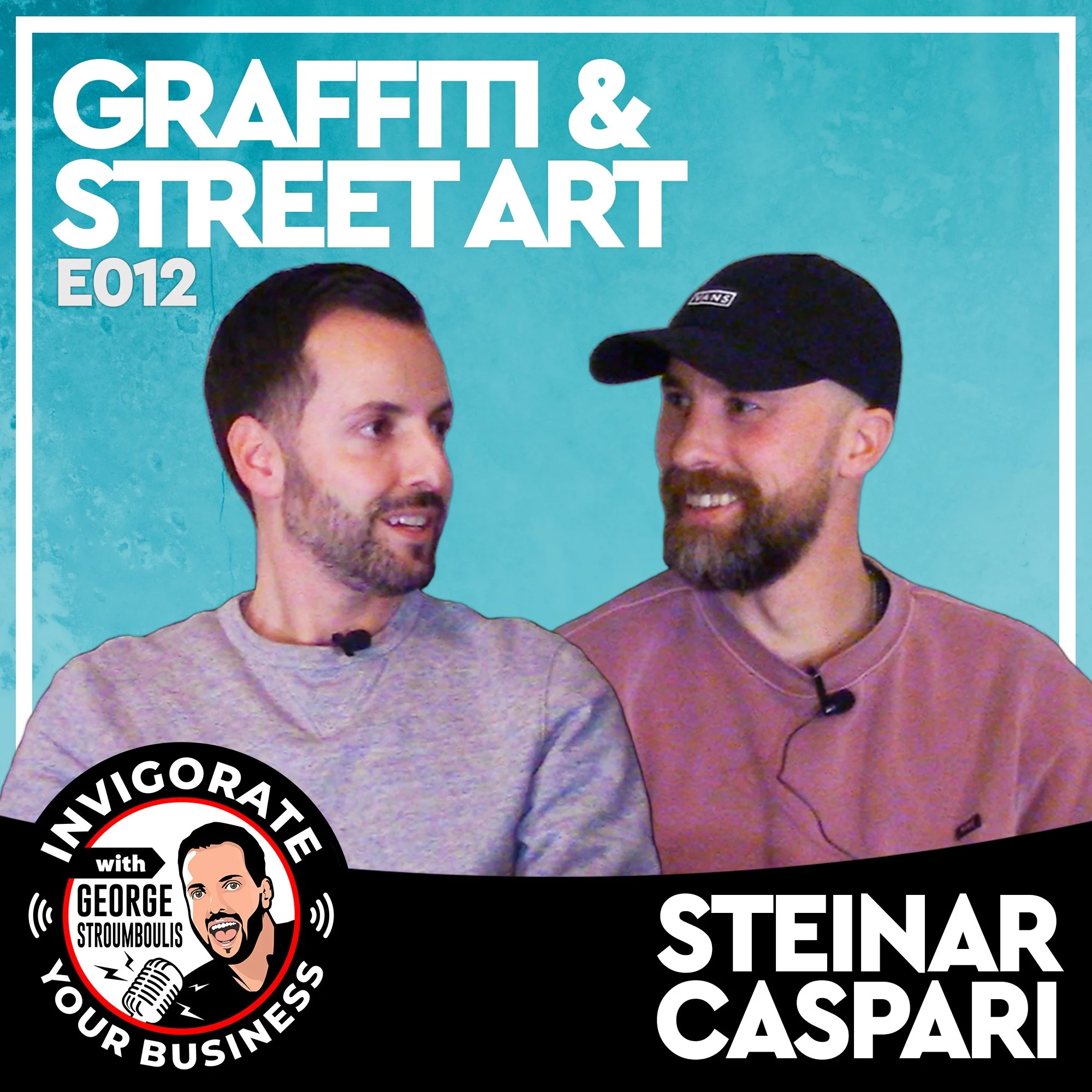
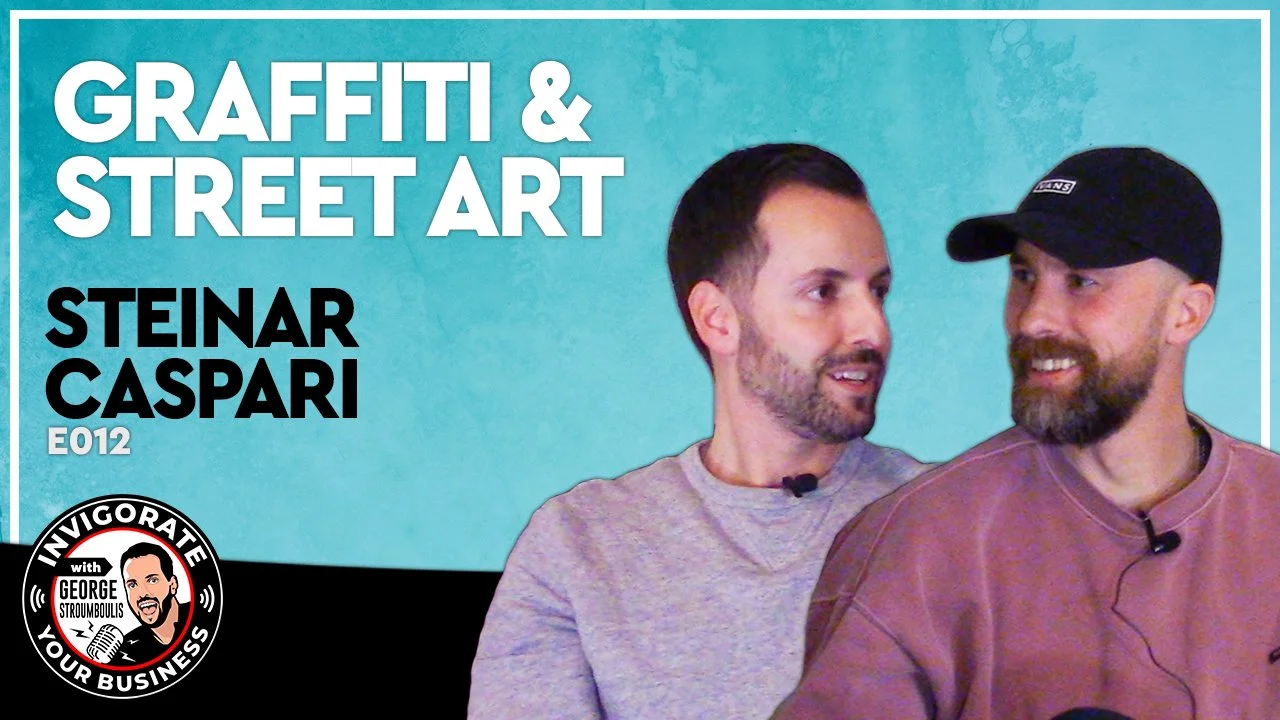
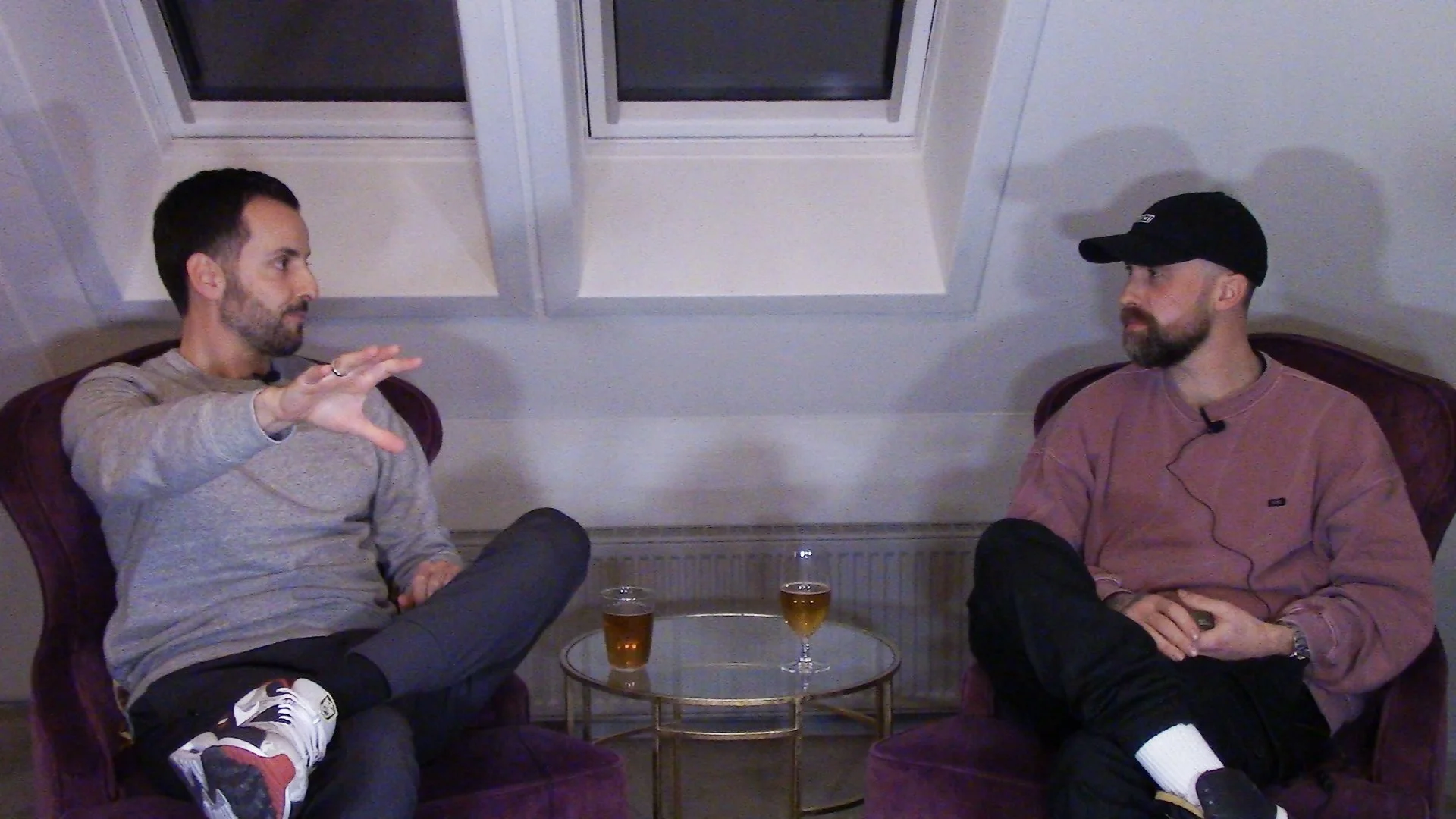
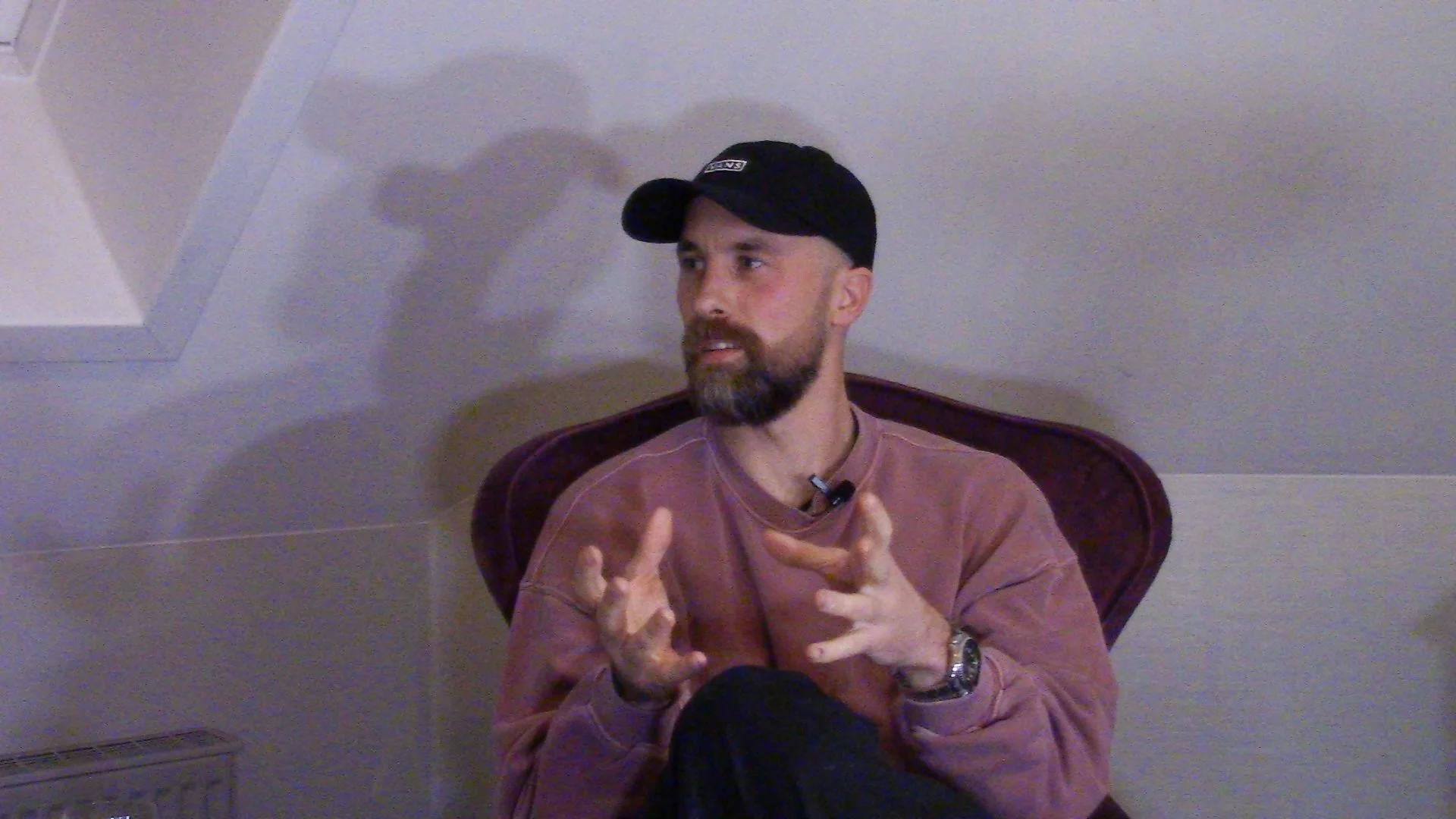
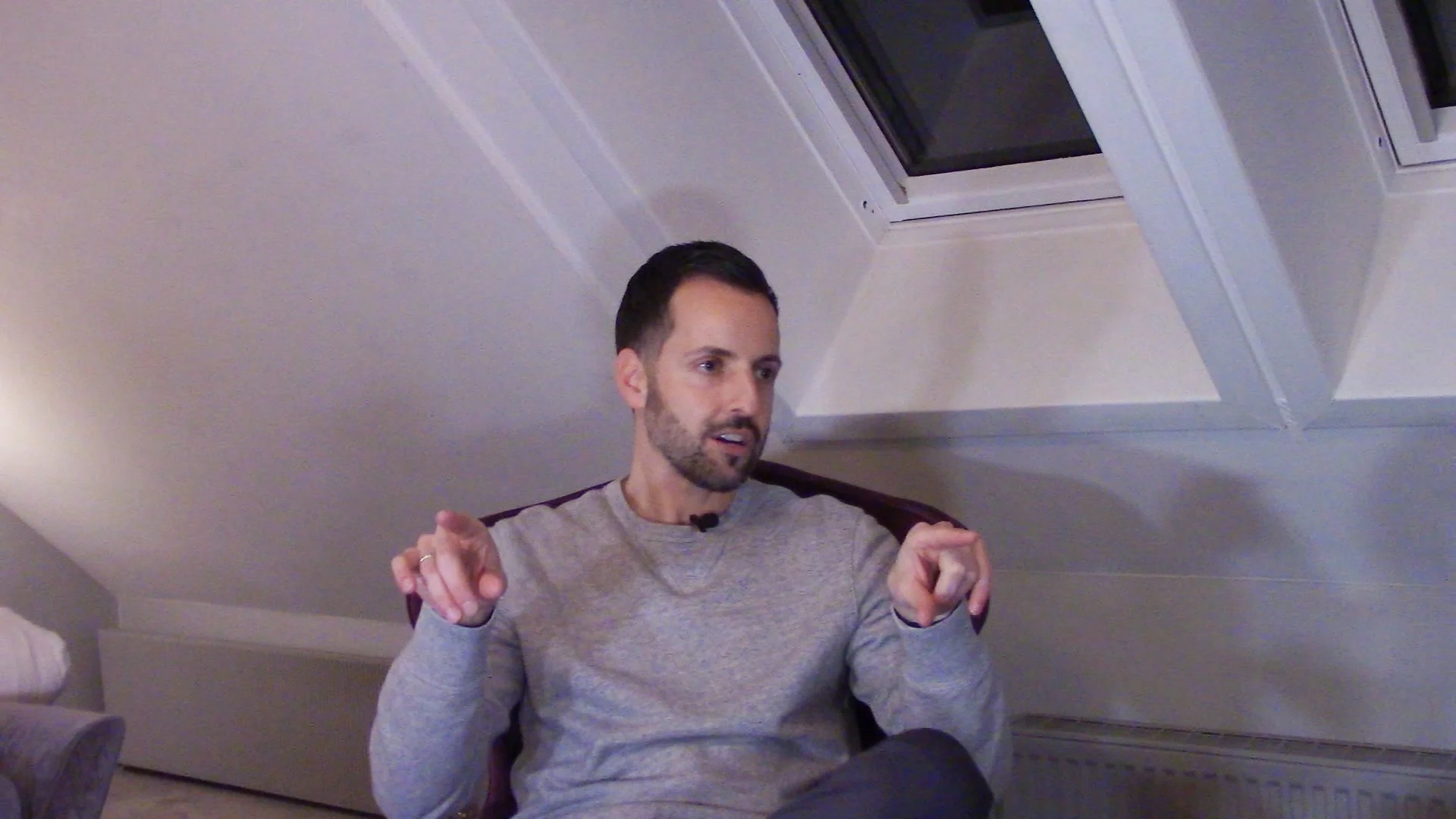

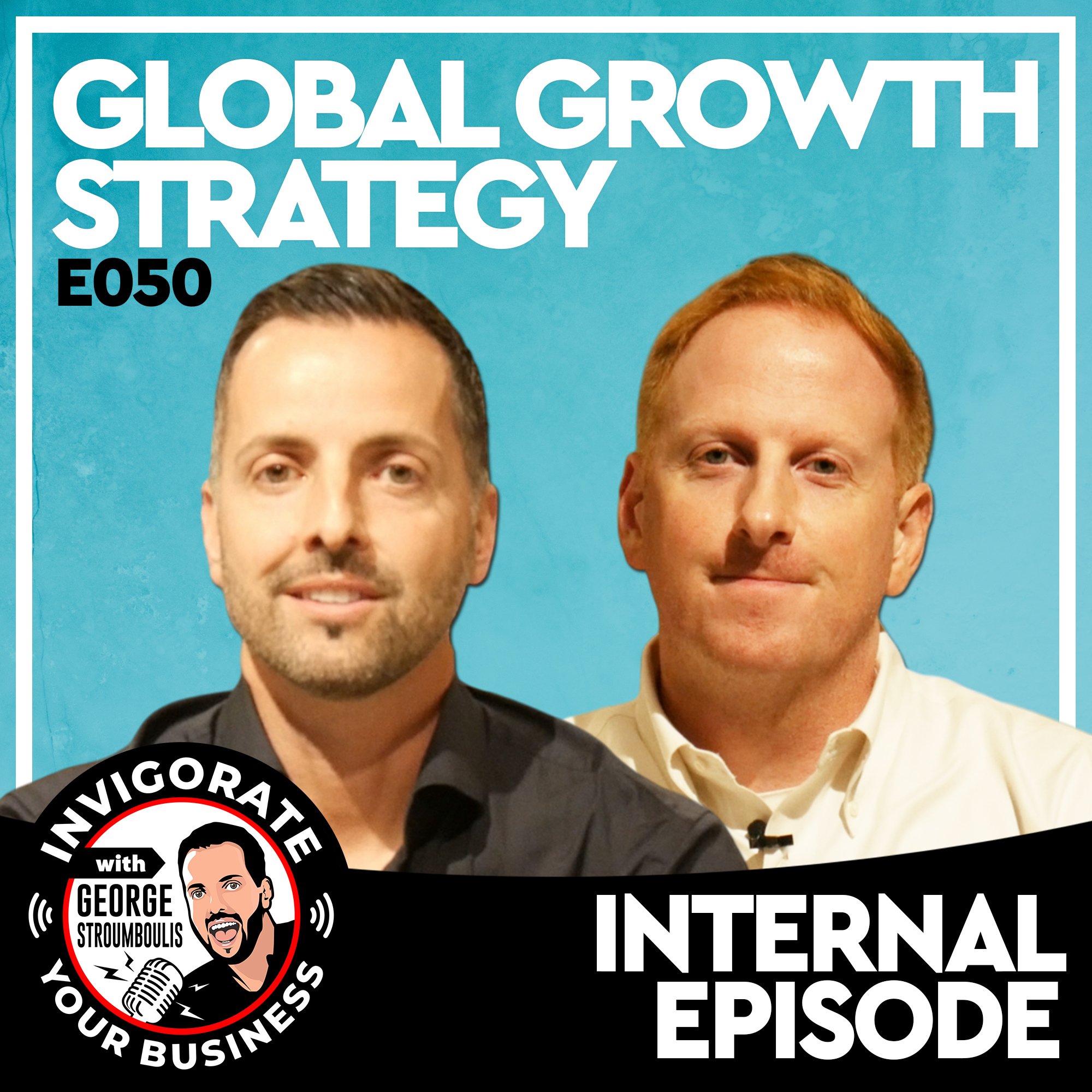





George Stroumboulis sits down with Thanasi Papoulias in Newport Beach, California on the Invigorate Your Business Podcast to talk about all things digital media, social media, influencing, online business strategies, celebrity interactions and so much more.